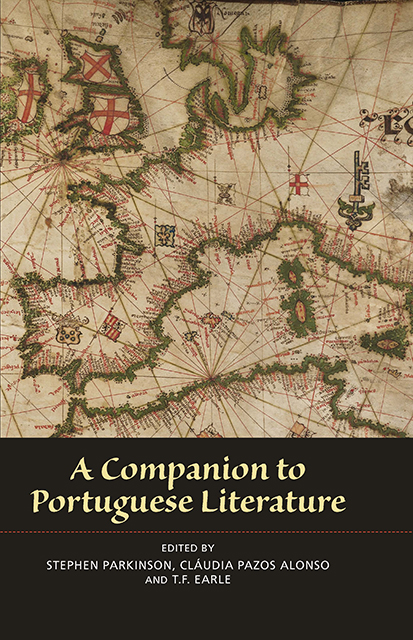Book contents
- Frontmatter
- Contents
- Acknowledgements
- Notes on the Contributors
- Introduction
- 1 Eight Centuries of Portuguese Literature: An Overview
- 2 The Medieval Galician-Portuguese Lyric
- 3 Fernão Lopes and Portuguese Prose Writing of the Middle Ages
- 4 Portuguese Theatre in the Sixteenth Century: Gil Vicente and António Ferreira
- 5 The Lusiads and the Literature of Portuguese Overseas Expansion
- 6 Lyric Poetry in the Sixteenth Century
- 7 The Seventeenth Century
- 8 The Eighteenth Century
- 9 Almeida Garrett: Founder of Modern Portuguese Literature
- 10 The Transition from Romanticism to Realism: Alexandre Herculano, Camilo Castelo Branco and Júlio Dinis
- 11 Eça de Queirós: A European Writer
- 12 Fernando Pessoa and the Modernist Generation
- 13 Narrative and Drama during the Dictatorship
- 14 Women Writers up to 1974
- 15 Writing after the Dictatorship
- 16 Portuguese Literature in English Translation
- Index
13 - Narrative and Drama during the Dictatorship
Published online by Cambridge University Press: 03 March 2023
- Frontmatter
- Contents
- Acknowledgements
- Notes on the Contributors
- Introduction
- 1 Eight Centuries of Portuguese Literature: An Overview
- 2 The Medieval Galician-Portuguese Lyric
- 3 Fernão Lopes and Portuguese Prose Writing of the Middle Ages
- 4 Portuguese Theatre in the Sixteenth Century: Gil Vicente and António Ferreira
- 5 The Lusiads and the Literature of Portuguese Overseas Expansion
- 6 Lyric Poetry in the Sixteenth Century
- 7 The Seventeenth Century
- 8 The Eighteenth Century
- 9 Almeida Garrett: Founder of Modern Portuguese Literature
- 10 The Transition from Romanticism to Realism: Alexandre Herculano, Camilo Castelo Branco and Júlio Dinis
- 11 Eça de Queirós: A European Writer
- 12 Fernando Pessoa and the Modernist Generation
- 13 Narrative and Drama during the Dictatorship
- 14 Women Writers up to 1974
- 15 Writing after the Dictatorship
- 16 Portuguese Literature in English Translation
- Index
Summary
The climate of fear the dictatorship of António de Oliveira Salazar fostered at various times during its long reign and its subtle and not-so-subtle censorship techniques had a profound impact on the cultural production of Portugal. Mediocre writers and playwrights were celebrated by the regime, through prizes and official approval. Yet, unlike under other authoritarian regimes, a significant amount of work that critiqued the premises and effects of Salazarism emerged within Portugal. The regime tended to use intimidation more than outright censorship, although some writers, such as José Cardoso Pires, did fall foul of the censor's blue pencil. However, Salazar preferred publishers and writers to police themselves, occasionally making examples of those who did not. This meant that much of the critique of and literary resistance to the regime was veiled, depending on metaphor and analogy.
The early years of Salazar's government saw the prominence of António Ferro (1895–1956) as the head of the state's propaganda machine. Ferro was himself a mediocre playwright and writer, who had been involved in the Modernist movement in Portugal. Through his friendship with the writer Mário de Sá-Carneiro (1890–1916), he had acquired, in 1915, the editorship of Orpheu, one of the movement's main publication venues. Ironically, given his future role in managing the Salazar regime's message through methods including censorship, his first play, Mar Alto (1923; High Sea), a rather dreary, one-dimensional depiction of an adulterous affair, was banned in 1923 when it was performed in Lisbon, on the grounds of public decency. The previous year, the play had been staged in Brazil as part of the aftermath of São Paulo's Semana da Arte Moderna (Modern Art Week).
Ferro rose to political prominence in Portugal writing positive narratives of dictatorships around Europe, including those of Mussolini and Mustapha Kemel. His Viagem à Volta das Ditaduras (1927; Journey Around the Dictatorships) was published the year after the coup that ended the First Republic, aligning him with an ideology that favoured culture's deployment in the cause of a national dictatorship. In 1932, he published a series of interviews with Salazar, and was soon thereafter put in charge of the National Propaganda Secretariat.
- Type
- Chapter
- Information
- A Companion to Portuguese Literature , pp. 157 - 167Publisher: Boydell & BrewerPrint publication year: 2009



